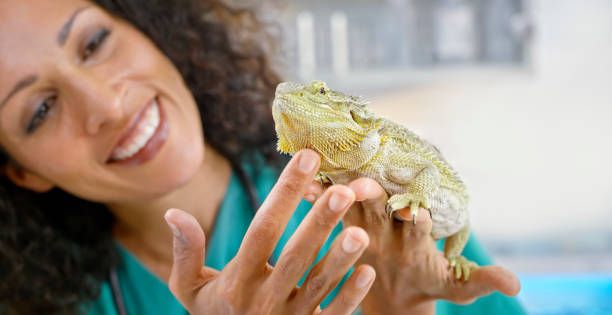The Centers for Disease Control (CDC) reported that Salmonella linked to pet bearded dragons has affected at least 15 individuals across nine states. Four people have been hospitalized, but no fatalities have occurred. New York recorded 4 cases, Ohio, and California each reported 3 cases. Iowa, Texas, Oklahoma, Tennessee, North Carolina, and Georgia each reported 1 case. The CDC indicated that the actual number of cases is likely higher than reported and may extend beyond the currently identified states.
Where the Salmonella-infected individuals live.
Image credits: CDC

When and how many people got sick with Salmonella.
Image credits: CDC

The outbreak strain identified is Salmonella Cotham. Among the affected individuals, 9 are preschool-aged children. Illness onset dates ranged from January 8, 2024, to May 16, 2024. Of those interviewed, 58% reported contact with a bearded dragon before becoming ill.
According to the CDC, “Bearded dragons can carry Salmonella germs in their droppings even if they look healthy and clean. These germs can easily spread to their bodies and anything in the area where they live and roam.”1
Children under 5 years old account for 60% of the reported illnesses. The CDC emphasized that bearded dragons are not recommended as pets for children under 5, adults over 65, or individuals with weakened immune systems due to the heightened risk of severe illness from reptile-associated germs.
Additionally, the CDC warned that bearded dragons can shed Salmonella in their feces even if they appear healthy. It is advisable to minimize contact between these individuals with weakened immune systems, and pet dragons to reduce the risk of illness.
This is the second Salmonella outbreak thus far in June 2024, on June 2, 162 people infected with the outbreak strain of Salmonella Africana have been reported from 25 states and the District of Columbia. There have been 54 people hospitalized, and no deaths associated with the outbreak of the 65 people interviewed, 47 (72%) reported eating cucumbers.2
People should call their healthcare providers if they have any of these severe Salmonella symptoms:2
- Diarrhea and a fever higher than 102°F
- Diarrhea for more than 3 days that is not improving
- Bloody diarrhea
- So much vomiting that you cannot keep liquids down
- Signs of dehydration, such as:
- Not peeing much
- Dry mouth and throat
- Feeling dizzy when standing up
These recent outbreaks of Salmonella Cotham linked to pet bearded dragons and Salmonella Africana from contaminated cucumbers highlight ongoing challenges in public health. The CDC’s investigations reveal concerning trends, with Salmonella Cotham notably affecting preschool-aged children despite precautions. Simultaneously, the widespread Salmonella Africana outbreak underscores the importance of food safety measures, with numerous hospitalizations reported nationally. These events emphasize the critical need for adherence to CDC guidelines, and prompt medical attention for severe symptoms associated with Salmonella infection, especially among vulnerable populations.
References
-
Salmonella Outbreaks Linked to Pet Bearded Dragons. Posted June 14, 2024. Accessed June 17, 2024. https://www.cdc.gov/salmonella/cotham-06-24/details.html
-
Parkinson, K. Potential Salmonella Outbreak Associated With Cucumbers. Contagion. Published June 6, 2024. Accessed June 17, 2024. https://www.contagionlive.com/view/potential-salmonella-outbreak-associated-with-cucumbers








